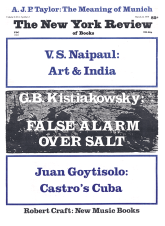In response to:
On Apollinaire from the October 26, 1978 issue
To the Editors:
Congratulations to Robert Mazzocco for his fine essay on Apollinaire in the October 26 issue. It was sprightly like Apollinaire himself. And how true it is that those who follow in his wake “do not possess his special poignance.”
Just a couple of minor corrections to keep the record straight: there were of course no trenches at Nîmes. That is where Apollinaire got his training before going north to the front in Champagne. And it was apropos of the ballet Parade in May 1917 that Apollinaire first used the term “sur-realism.”
L.C. Breunig
French Department
Barnard College
New York City
Robert Mazzocco replies:
I want to thank Professor Breunig for his kind letter. And of course there were no trenches at Nîmes—that was a stupid mistake. The genesis of the term “sur-realism,” however, seems to me more complex. When I wrote of Apollinaire that the “name was his own invention (though applied by him originally to the paintings of Chagall),” I was in fact referring to the source of the term as he initially conceived it—and indeed as he was so to employ it on various occasions long before the premier of Parade. Unfortunately I did not bother to qualify the matter in the essay, but what I was pointing to was the assertion made by Chagall in his autobiography that once in a conversation with Apollinaire (generally thought to have taken place as early as 1912), the poet judged the paintings of his friend to be examples of surnaturalisme—or, in other words, surrealism in its embryonic state. Later a poem by Apollinaire dedicated to Chagall, first entitled “Rotsoge,” then “A travers l’Europe,” prefaced the catalogue introducing the exhibition of Chagall’s works in Berlin in 1914—a poem containing the very surrealist line: “La cheminée fume loin de moi des cigarettes russes.” Shortly thereafter Apollinaire reprinted the poem in the magazine, Les Soirées de Paris, in whose pages he had more than once been in the habit of declaring himself a “sur-naturalist.”
Finally, in a letter to Paul Dermée, the poet observed: “After thinking over the question carefully, I prefer to adopt the word Surréalisme, rather than the Surnaturalisme I used at first. Surréalisme does not yet exist in the dictionary and will be easier to manipulate than Surnaturalisme, which has already been used by philosophers.” According to Cecily Mackworth in her book on Apollinaire, the letter to Dermée is dated “March 1917″—if so, it would precede by two months the use of the term in its official unveiling in the program note for Parade, as justly cited by Professor Breunig. I might add that in the years prior to Parade, Apollinaire’s relations with Breton, and indirectly with Soupault and Aragon and Reverdy, produced an atmosphere where surrealism—either as an effort at a new sensibility or an Esprit Nouveau—was already operating, though of course under the designation surnaturalisme. And this despite the reservations that Breton would subsequently express about Apollinaire—namely that he possessed “que la lettre, encore imparfaite, du surréalisme…”—in the famous Manifeste du surréalisme of 1924.
This Issue
March 22, 1979



